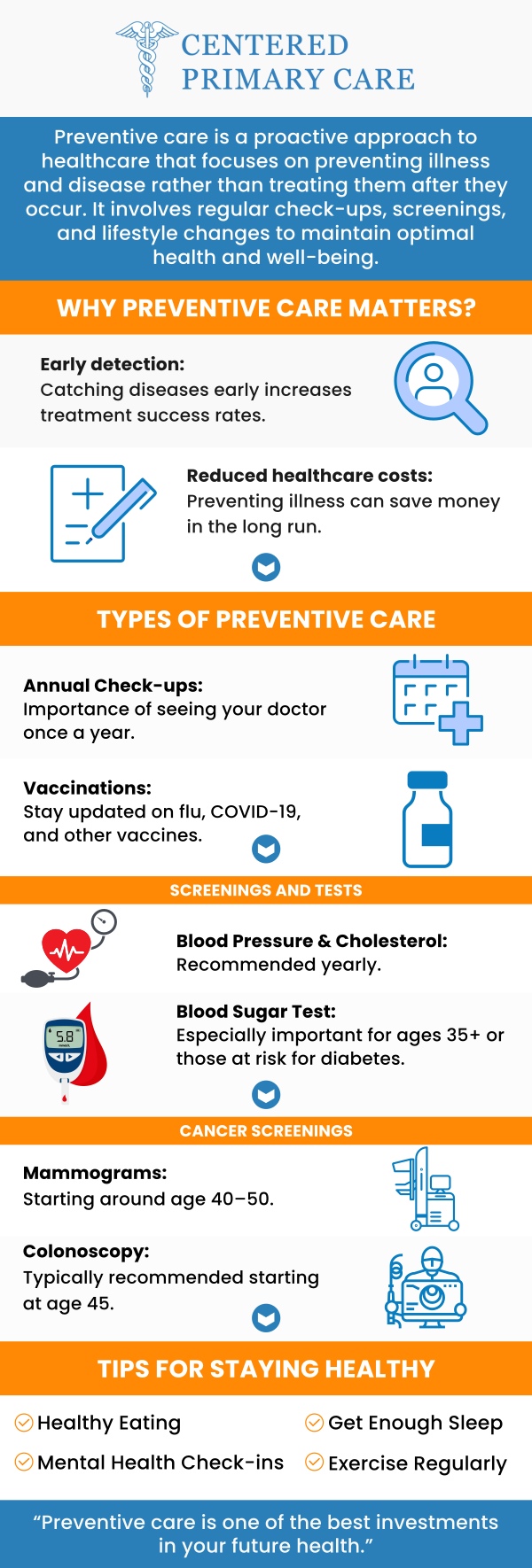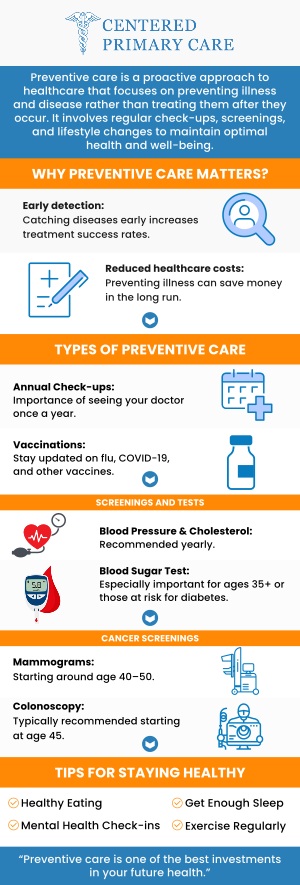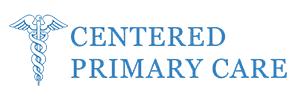Trusted Preventative Care Services in Stoughton, MA
At Centered Primary Care, we provide preventative care for various health conditions before they become critical. Preventive care is an essential aspect of maintaining good health and well-being. It involves taking proactive measures to prevent the onset or progression of diseases and to promote overall wellness. Preventative care helps people stay healthy and reduces their chances of developing other health problems. For more information, contact us today or schedule an appointment online. We are conveniently located at 966 Park Street, Suite B6, Stoughton, MA 02072.




Table of Contents:
What is preventive care and why is it important?
What are the types of preventive care?
What is an example of preventive care?
What’s the difference between preventive care and diagnostic care?
Preventive care encompasses a range of healthcare practices aimed at promoting and preserving health. It involves taking proactive steps to prevent the occurrence of diseases or complications, rather than just treating them after they have developed. Examples of preventive care measures include vaccinations, screenings, regular check-ups, and lifestyle modifications such as maintaining a healthy diet and engaging in regular exercise. These measures are designed to identify potential health risks early on, allowing for timely intervention and treatment. By focusing on prevention, individuals can take control of their health and reduce the likelihood of developing chronic conditions or experiencing complications.
The benefits of preventive care are manifold. Firstly, it facilitates early detection and treatment of potential health issues. Regular screenings and check-ups enable healthcare professionals to identify risk factors and detect diseases in their early stages when they are more treatable. For example, routine mammograms can detect breast cancer at an early stage, significantly improving the chances of successful treatment. Secondly, preventive care is cost-effective.
By investing in preventive measures, individuals can avoid the high costs associated with treating advanced diseases. For instance, the cost of treating a preventable condition such as diabetes or heart disease is significantly higher than the cost of implementing preventive measures such as regular exercise and a healthy diet. Lastly, preventive care improves the overall quality of life and reduces healthcare expenses in the long run. By maintaining good health and preventing the onset of chronic conditions, individuals can enjoy a higher quality of life and avoid the financial burden of managing chronic illnesses.
There are many different types of preventative care available including:
• Blood Pressure, Diabetes, and Cholesterol Tests
• Many cancer screening tests, including mammograms and colonoscopies.
• Advice on topics such as smoking cessation, weight loss, healthy eating, treating depression and reducing alcohol consumption regular visits to babies and children.
• Get regular vaccinations against diseases like measles, polio, or meningitis.
• Advice, tests and vaccinations to ensure a healthy pregnancy.
• Flu shots and other vaccinations.
Prevention helps detect or prevent serious illnesses and medical problems before they become serious. Annual checkups, immunizations, and flu shots, and certain tests and examinations are some examples of preventive care.
Preventive care refers to healthcare measures taken to prevent the onset or progression of diseases. Its primary objective is to identify and address potential health risks before they develop into more serious conditions. Preventive care encompasses a wide range of interventions, including vaccinations, screenings, and lifestyle modifications. For instance, routine vaccinations protect individuals from infectious diseases such as measles, mumps, and influenza. Similarly, screenings such as mammograms, Pap smears, and colonoscopies aid in the early detection of cancer, allowing for timely treatment and improved outcomes.
The benefits of preventive care are manifold. Firstly, it enables the early detection of diseases when they are most treatable, significantly reducing morbidity and mortality rates. Secondly, preventive care helps to mitigate healthcare costs by preventing the need for expensive treatments and hospitalizations. Additionally, it promotes overall well-being by encouraging healthy behaviors and lifestyle modifications. By focusing on prevention, individuals can take proactive steps to maintain their health and reduce the risk of developing chronic conditions.
Diagnostic care, on the other hand, involves the identification and diagnosis of diseases or conditions that have already manifested in individuals. Its primary objective is to determine the cause, nature, and extent of an illness or injury. Diagnostic care encompasses various procedures, including medical imaging, laboratory tests, and physical examinations. For instance, medical imaging techniques such as X-rays, CT scans, and MRIs provide detailed visualizations of internal structures, aiding in the diagnosis of fractures, tumors, and other abnormalities. Laboratory tests, such as blood tests and biopsies, help identify specific diseases or assess organ function. The benefits of diagnostic care lie in its ability to provide accurate and precise diagnoses, enabling healthcare professionals to develop appropriate treatment plans. By identifying the underlying cause of symptoms or abnormalities, diagnostic care helps guide therapeutic interventions, leading to improved patient outcomes. Additionally, diagnostic care plays a crucial role in monitoring disease progression and treatment effectiveness, allowing for timely adjustments to the management plan.
While preventive care and diagnostic care have distinct objectives, they both contribute to the overall health and well-being of individuals. Preventive care focuses on identifying and addressing potential health risks before they manifest, aiming to prevent the onset of diseases. On the other hand, diagnostic care focuses on identifying and diagnosing diseases that have already developed. Despite these differences, both approaches are interconnected and essential for optimal healthcare outcomes. A balanced approach that incorporates both preventive and diagnostic care is crucial. Preventive care helps individuals maintain their health and prevent the development of diseases, while diagnostic care ensures accurate diagnosis and appropriate treatment planning when diseases do occur. By combining these approaches, healthcare professionals can provide comprehensive care that addresses both the prevention and management of diseases.
For more information, contact us today or schedule an appointment online. We are conveniently located at 966 Park Street, Suite B6, Stoughton, MA 02072. We serve patients from Stoughton MA, Avon MA, Canton MA, Walpole MA, Easton MA, Abington MA, and surrounding areas.

Check Out Our 5 Star Reviews



Additional Services You May Need
▸ Primary Care
▸ Weight Management
▸ Chronic Pain Management
▸ Stemwave
▸ Sick Visits
▸ Telehealth
▸ Immigration Physical Exams
▸ Health Education and Counseling
▸ Ultrasound Guided Joint Injection
▸ Mental Health Care
▸ Weight Loss Injections
▸ Chronic Disease Management
▸ Preventative Care
▸ Cryotherapy
▸ Skin Tag Removal
▸ Pediatric Vaccine
▸ Zepbound
▸ Phentermine
▸ Mounjaro
▸ Wegovy



